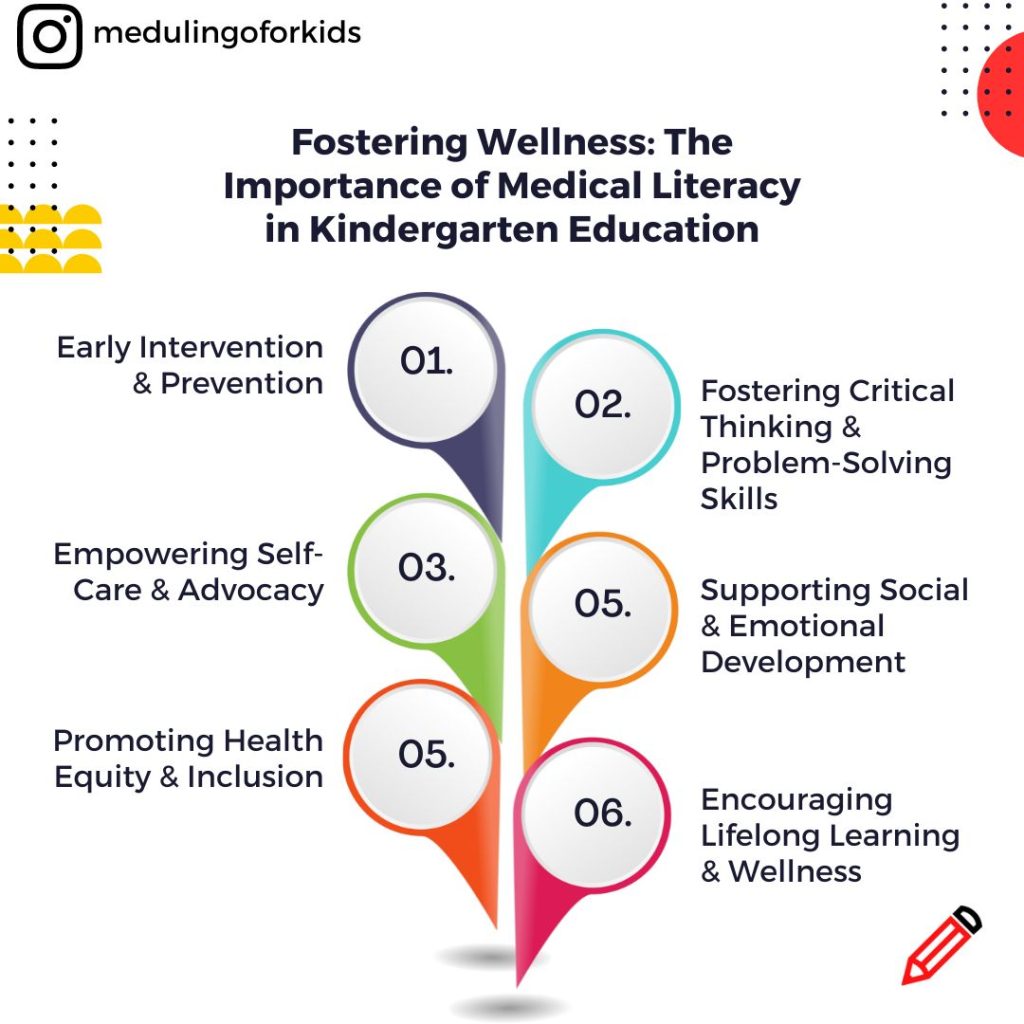In the landscape of early childhood education, the inclusion of medical literacy in kindergarten curriculum emerges as a pivotal component of fostering holistic development and wellness in young learners. Medical literacy encompasses the knowledge, skills, and attitudes necessary for individuals to make informed decisions about their health and well-being. By introducing medical literacy from kindergarten and fostering wellness, educators lay the foundation for a lifetime of health awareness, preventive care, and informed decision-making.

Here’s why medical literacy needs to be included in kindergarten as part of a holistic education:
1. Early Intervention and Prevention:
Kindergarten serves as a critical time to instill healthy habits and preventive care practices in young children. By introducing medical literacy, educators empower children to recognize signs of illness, understand basic health concepts, and adopt healthy behaviors from an early age. Through age-appropriate discussions, activities, and resources, children learn about topics such as nutrition, hygiene, safety, and physical activity. By promoting early intervention and prevention strategies, medical literacy in kindergarten lays the groundwork for a lifetime of health and wellness.
2. Empowering Self-Care and Advocacy:
Medical literacy equips children with the knowledge and skills to take an active role in their own health care and advocacy. From understanding common illnesses and symptoms to learning how to communicate their health needs effectively, children develop a sense of agency and empowerment over their well-being. By fostering self-care practices and encouraging open dialogue about health-related topics, educators create an environment where children feel confident in seeking help when needed and advocating for their health needs.
3. Promoting Health Equity and Inclusion:
Incorporating medical literacy in kindergarten promotes health equity and inclusion by ensuring that all children have access to medical language and resources. By addressing diverse health needs and experiences, educators create a culture of inclusion where every child’s health and well-being are valued and supported. Medical literacy instruction promotes understanding and empathy towards individuals with different health conditions, fostering a sense of community and mutual support among students.
4. Fostering Critical Thinking and Problem-Solving Skills:
Engaging with medical literacy encourages critical thinking and problem-solving skills essential for navigating health-related challenges. Through inquiry-based learning approaches, children learn to evaluate health information, make informed decisions, and solve health-related problems. By exploring topics such as disease prevention, safety practices, and healthy lifestyle choices, children develop a deeper understanding of the factors that influence health outcomes and learn to apply critical thinking skills to real-world situations.
5. Supporting Social and Emotional Development:
Medical literacy instruction in kindergarten supports social and emotional development by promoting empathy, resilience, and self-awareness. Through discussions about health-related experiences, children learn to recognize and express their emotions, develop coping strategies, and cultivate empathy towards others. By creating a safe and supportive environment for discussing health-related topics, educators help children build positive relationships, develop communication skills, and foster a sense of belonging within their classroom community.
6. Encouraging Lifelong Learning and Wellness:
By introducing medical literacy in kindergarten, educators plant the seeds for a lifelong journey of learning and wellness. Children develop a curiosity and appreciation for their bodies, health, and well-being, fostering a lifelong commitment to healthy habits and preventive care. Through ongoing education and reinforcement of medical literacy concepts, children continue to build on their knowledge and skills, adapting to new information and emerging health challenges throughout their lives.
Start Fostering Wellness with Medical Literacy in Kindergarten
In conclusion, the inclusion of medical literacy in kindergarten curriculum is essential for fostering holistic development, empowering children to make informed decisions about their health and well-being, and promoting a culture of wellness and inclusion. By introducing medical literacy from an early age, educators lay the foundation for a lifetime of health awareness, preventive care, and empowered self-advocacy. As we embrace the transformative power of medical literacy, let us nurture a generation of children who prioritize their health and well-being, advocate for their needs, and contribute to a healthier and more equitable society.
===
Interested in teaching medical literacy pain free? Shop medical literacy resources!

This article was drafted by ChatGPT and edited by Joan Lee Tu, the founder of MedULingo.com.
You may also be interested in the following articles:
Medical Literacy from Kindergarten: Builds a Foundation for Lifelong Learning
Planting Seeds: The Case for Starting Medical Literacy in Kindergarten
Cultivating Allergy Awareness from Kindergarten with Medical Literacy
Planting Seeds: The Case for Developing Medical Literacy on Allergies in Kindergarten
The Benefits of Developing Medical Literacy About Dermatitis from Kindergarten
Planting Seeds: The Case for Medical Literacy on Dermatitis from Kindergarten
Cultivating Lifelong Learning in Medical Literacy: From Kindergarten to Old Age
Fostering Wellness: The Importance of Medical Literacy in Kindergarten Education
Embracing Health: The Benefits of Medical Literacy in Kindergarten Education

